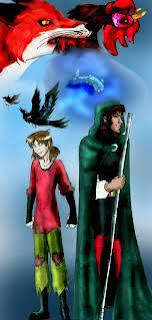This Indian Folk tale story is collected from the book, named “Indian Fairy Tales”. This book is edited by Joseph Jacob, published by G.P. Putnam’s Sons, New York, London in 1910. This folk tale story book holds 29 Indian folk tale stories.
 |
| Why the Fish laughed |
Why the Fish laughed (Part-2)
- An Indian folk tale
Presently they had to wade through a stream that ran along the edge of the graveyard. The water was rather deep, so the old farmer took of his shoes and paijamas and crossed over; but the young man waded through it with his shoes and paijamas on.
"Well! I never did see such a perfect fool, both in word and in work," said the old farmer to himself.
However, he liked the fellow; and thinking that he would amuse his wife and daughter, he invited him to come and stay at his house as long as he had occasion to remain in the village.
"Thank you very much," the young man replied; "but let me first inquire, if you please, whether the beam of your house is strong."
The old farmer left him in disappointment, and entered his house laughing.
"There is a man in near by field," he said, after returning their greetings. "He has come the greater part of the way with me, and I wanted him to put up here as long as he had to stay in this village. But the fellow is such a fool that I cannot make anything out of him. He wants to know if the beam of this house is all right. The man must be mad!" and saying this, he burst into laughter.
"Father," said the farmer's daughter, who was a very sharp and wise girl, "this man, whosoever he is, is no fool, as you think him. He only wishes to know if you can afford to entertain him."

























